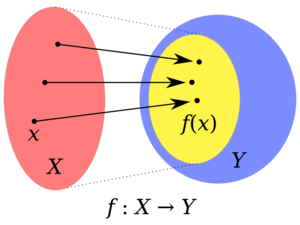Range (mathematics) facts for kids
In mathematics, the word range can mean a few different things. It often talks about a set of numbers or values. You might hear about the range of a function, the range in statistics, or even a range of numbers like an interval.
Contents
What is Range in Math?
When we talk about the range in math, it usually means one of two things:
Range of a Function
The range of a function is all the possible answers or outputs you can get from that function. Imagine a machine that takes numbers in and gives new numbers out. The range is the collection of all the numbers that can come out of that machine.
For example, if you have a function that doubles any number you put in, and you can only put in positive numbers, then the range would be all positive even numbers.
Range in Statistics
In statistics, the range is much simpler. It's the difference between the highest and lowest values in a set of data. It tells you how spread out your data is.
To find the range in statistics:
- Find the biggest number in your data.
- Find the smallest number in your data.
- Subtract the smallest number from the biggest number.
For example, if you have the numbers {4, 6, 9, 3, 7}:
- The lowest value is 3.
- The highest value is 9.
- The range is 9 - 3 = 6.
Range as an Interval
Sometimes, the word "range" can also mean an interval. An interval is a set of all real numbers between two given numbers. For example, if someone says "the numbers are in the range of 1 to 10," they mean any number from 1 up to 10, including 1 and 10.
Related pages
 | Jessica Watkins |
 | Robert Henry Lawrence Jr. |
 | Mae Jemison |
 | Sian Proctor |
 | Guion Bluford |


